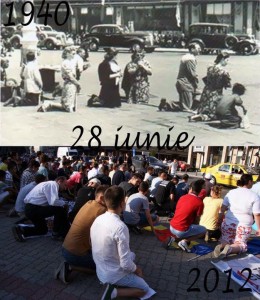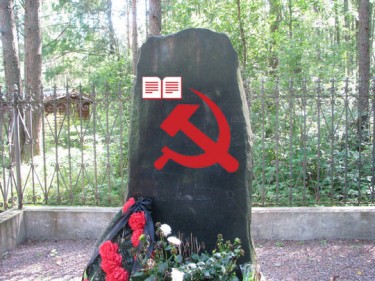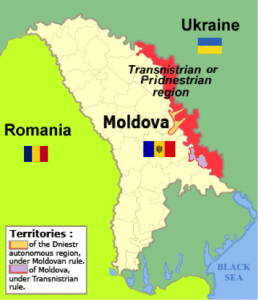The Islamic League (Liga Islamica) was officially registered early this spring in Moldova [en], after having been denied this right for several years. [All links in Romanian unless otherwise noted.]
Moldova's Muslim community is rather small, numbering around 17,000 people in a country of about 4 million citizens. Approximately 95 percent of the Moldovan population is Orthodox Christian and, according to the latest opinion poll (May 2011), 82 percent of the people have the highest trust in the church (in comparison: the army - 50 percent; local authorities - 47 percent; the government - 23 percent).
The Orthodox Church of Moldova has solicited the government to withdraw its decision and to revise the religious law (Legea cultelor), so that the population can be consulted beforehand. Reactions have varied, from politicians declaring that the registration of the League is a “blasphemy” and “can bring prejudices to the society,” to priests stating it is a “degradation to the official religion” and a “humiliation to the Orthodox believers in Moldova“, to religious protesters equipped with bells and crosses who marched through the city center in Moldova's capital Chişinău, voicing their discontent (photos are here), ending with the prime minister promising to look into the matter.
Blogger Nicu Popescu has come up with arguments combating the “main false statements” that have been circulated within this debate.
False argument 1: “How many churches are in Saudi Arabia and why do we have to allow mosques in Moldova”
He argues:
I do not want Moldova to imitate in any way Saudi Arabia. I want the women in Moldova to be able to drive cars, go out, and the state to be separate from the church. Whoever wants to imitate Saudi Arabia are the people who do not desire good for this country.
He brings up the example of the Christian communities in Syria and Egypt, where approximately 10 percent of the population are Christian and churches are fully functioning:
It is regrettable that some Moldovan citizens have a higher degree of religious intolerance than the Syrian or Egyptian authorities – authoritarian states, which in the last months have killed their own citizens, but which at the same time recognize the Christian religion and have on many occasions protected the churches from attacks by radical Muslims.
False argument 2: “Islam does not correspond to the history and traditions of this land and the Christian majority is against its recognition (?)”
I disagree. I believe Moldova has to respect the religious minorities, including the Muslim one; and the non-Christian states like Syria or China have to respect the rights of the Christian minorities.
False argument 3: “Muslims and terrorism”
Let’s be serious. Does anyone really believe that fundamentalist Muslims need to be legally registered in order to commit terrorist attacks? As if Bin Laden tried to register his prayer house in the U.S. before September 11. Absurd.
And the connection between religion and terrorism/radicalism is a bit more complex. The Middle East is a complex region where all communities have committed a number of crimes – Muslims, Jews, Christians.
False argument 4: “Stefan cel Mare [en] and our ancestors fought Muslims/Turks, and we cannot allow them to now legalize their religion”
Historical argument is not relevant. And if Moldova had fought against Russia, do we have to interdict the Russian church?”
Popescu concludes:
The church of Moldova has to combat the ideas promoted by other religions by demonstrating that it is better, closer to the citizens, has smarter, more educated and less corrupted priests, etc., and not through hysterical pressures on the Moldovan state, which has to be neutral in religious affairs.
Another blogger, Vlad Cubreacov, brings into the debate the idea that putting Muslims outside the law would only degrade the religious climate in the country, but also could lead to some tensions with external partners:
It is a generally-known fact that states like Israel, the Russian Federation, Armenia or Azerbaijan are sensitive to the way their minorities are treated in other countries. We can assume that cancelling the registration of the Islamic League in Moldova can raise problems in the relations between Chisinau and Baku or Moscow.
Cubreacov concludes:
We believe that a Muslim community maintained within the legal system and integrated into the society is preferred to one that is left on its own account, an easy target to all kinds of integralists and Islamic fundamentalists.
Vlada Ciobanu does not understand:
Why when there are so many Moldovans abroad, and many churches and Orthodox priests can hold their services around the world, do we have to go out with icons, crosses and not let other people enjoy freedom.











